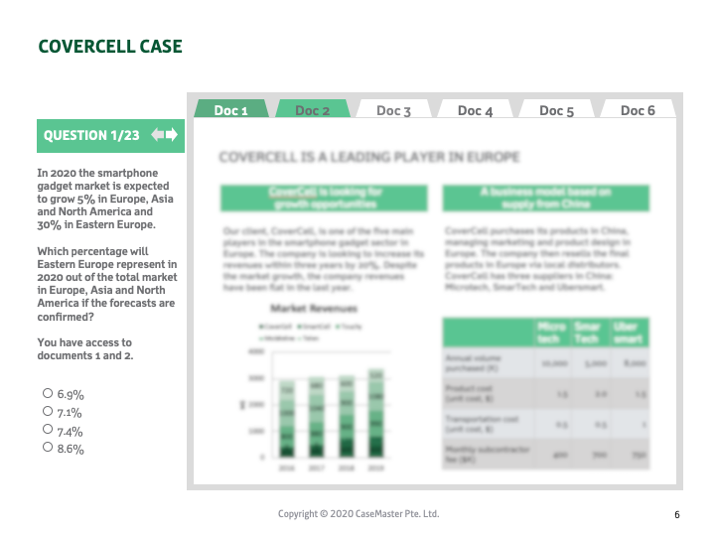Hi,
Has anyone sat the BCG potential test when calculators have been allowed? How many questions/ time did you have? And for which office was this?
Thanks
Hi,
Has anyone sat the BCG potential test when calculators have been allowed? How many questions/ time did you have? And for which office was this?
Thanks


Hi Anonymous,
The BCG Online Case - also called Potential Test in some offices - is a multiple choice computer test with 23 questions to be answered in 45 minutes.
It has one single case only. You receive +3 for each right answer, 0 for no answer and -1 for a wrong answer.
Calculators are generally not allowed, but there are exceptions in some countries - you can clarify that with HR if needed.
I recommend the following approach to prepare:
As additional notes:
If you want to practice on a real example of a BCG Potential Test, you can find the one I created below:
https://www.preplounge.com/en/shop/tests-2/bcg-potential-testonline-case-1-13
With this test you will be able to:
Below you can find a screenshot of the test:

That being said, BCG has been rolling out a new BCG Online Case (also called the Chatbot Interview) since 2019. It is a 8-10 questions test structured in 2 parts:
The main differences compared to the previous version (BCG Potential Test) are the following:
The main challenges based on the candidates I helped are the following:
If you want to prepare in the best possible way, I created a guide exactly for that.
This guide will:
And much more ;)
You can download the guide instantly here:
https://www.preplounge.com/en/shop/tests-2/bcg-online-case-secrets-69

As an extra bonus, I am currently offering the BCG Potential Test #1 (worth $39) and Graph Analysis Cheat Sheet (worth $29) for free with the guide. That may change in the future so hurry up if you are interested ;)
If you need additional support or have any questions on the guide please feel free to PM me, I will reply within 12 hours.
Hope this helps,
Francesco

Dear A,
BCG test includes 23 questions and you will be given about 45 minutes to complete it. This means you will have two minutes to solve each question on average. The BCG online case is very similar to a regular case the only difference being that your direction in the business case is guided by the questions being asked. So it will be similar to an "interviewer-led" case format. There are a lot of resources online for case solving and all you need to do is Google. If you want to sharpen your case skills in general I would recommend Victor Cheng's Case Interview Secrets by Victor Cheng and his book. However, since the BCG Online Case is also a single-choice test, you can also use this format to your advantage. You’ll receive+3 points for correct answers and -1 for wrong answers. Currently, the inofficial cut-off score is below 70-75%. Message me if you have any other specific questions and all the best!
Best,
André

You will be given 45 minutes for 23 questions.
If you have already started your preparation for case interviews and good at reading charts, analytical thinking, and mental math, then BCG potential is an additional of probably an hour as what you should plan for.
Regarding the question types
Do you have any further questions?
GB











